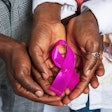Race and ethnicity influence the likelihood that women in the U.S. will receive an early diagnosis of breast cancer, as well as their survival after stage I diagnosis, according to a study published in the new issue of the Journal of the American Medical Association.
However, these differences could be attributed to biological factors such as lymph node metastasis and triple-negative tumors, wrote lead study author Dr. Javaid Iqbal, from Women's College Hospital in Toronto, and colleagues.
"We found that probability of small-sized breast cancer tumors having spread to regional lymph nodes or distantly varied between women with different racial/ethnic backgrounds and may reflect variations in the intrinsic biology of their tumors," Iqbal and colleagues wrote.
The researchers examined data from 452,215 women identified in the Surveillance, Epidemiology, and End Results (SEER) database who were diagnosed with invasive breast cancer between 2004 and 2011. They assessed the biological aggressiveness of tumors smaller than 2 cm in women in eight different racial and ethnic groups, calculating breast cancer stage at diagnosis and seven-year breast cancer-specific survival rates after adjusting for age at diagnosis, income, and estrogen-receptor status (JAMA, January 13, 2015, Vol. 313:2, pp. 165-173).
Of 373,563 women with invasive breast cancer, 71.9% were non-Hispanic white, 9.4% were Hispanic white, 10.4% were black, 6.7% were Asian (Chinese, Japanese, South Asian, and other Asian), and 1.6% were other ethnicities. Mean follow-up time was 40.6 months, Iqbal and colleagues wrote.
Compared with non-Hispanic white women diagnosed with stage I breast cancer (50.8%), Japanese women (56.1%) were more likely to be diagnosed and black women (37%) were less likely to be diagnosed, the researchers found.
Risk of death from stage I breast cancer at seven years postdiagnosis was higher among black women (6.2%) than non-Hispanic white women (3%) and South Asian women (1.7%). Black women were more likely to die of breast cancer with small-sized tumors (9%) than non-Hispanic white women (4.6%), and this difference remained after Iqbal's group adjusted for income and estrogen-receptor status.
Although biological factors play a part in differences in breast cancer survival among women of different races and ethnicities, it's important to keep social and economic factors in mind as well, the group cautioned.
"In our study, survival was associated with biological differences in tumor characteristics (e.g., between black women and women of other ethnicities) but factors such as socioeconomic status, access to and use of healthcare, adherence to treatment, and comorbidity might also contribute to breast cancer disparities," Iqbal and colleagues concluded.




















